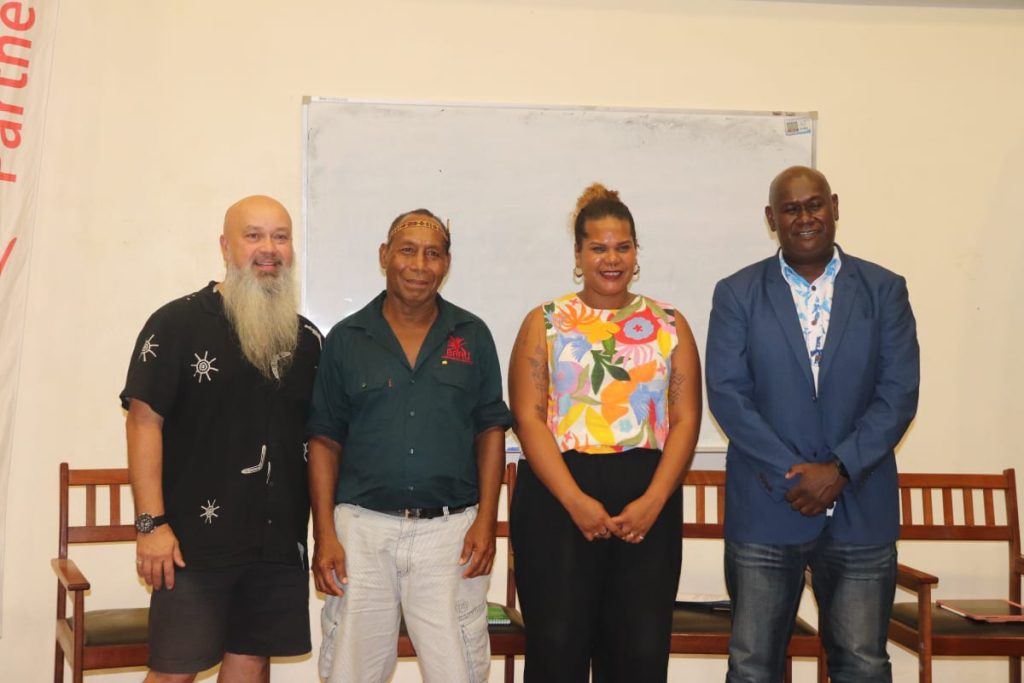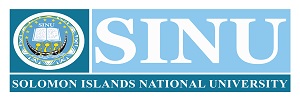
𝐏𝐫𝐞𝐬𝐬 𝐑𝐞𝐥𝐞𝐚𝐬𝐞
𝟐𝟏 𝐌𝐚𝐲 𝟐𝟎𝟐𝟓
The Solomon Islands National University (SINU) hosted a pivotal event as part of the SINU-Australia Seminar Series on Tuesday, 20th May 2025, from 6:00 PM to 7:00 PM at the Kukum Campus Lecture Theatre.
Featuring Professor Bradley Moggridge and Chief Esau Kekeuabata, the seminar explored the vital role of indigenous cultures, traditions, and knowledge in addressing climate change. The event aligns with SINU’s transformative Centre for Islands Future (CIF), as highlighted by Dr. Vaeno Wayne Vigulu, Dean of the Faculty of Agriculture, Fisheries, and Forestry (FAFF), during his opening remarks.
Professor Bradley Moggridge, a proud Kamilaroi man from Ngunnawal Country in Canberra, Australia, is a Professor of Science and Associate Dean (Indigenous Leadership and Engagement) at the University of Technology Sydney. Chief Esau Kekeuabata, Chief and Founder of the Baru Conservation Alliance, works to protect the socio-ecological systems of traditional Kwaio communities in Malaita Province.
The seminar highlighted shared climate challenges such as sea level rise, storms, droughts, and floods, and facilitated discussion on how indigenous knowledge contributes to climate change adaptation and resilience.
In his opening remarks, Dr. Vigulu stated ,“the seminar is a timely and highly relevant initiative, especially for us from low-lying islands, as we continue to confront the complex interplay between environmental challenges and indigenous knowledge systems in the Pacific. The impacts of climate change are more severe in poor and marginalized populations, like indigenous communities, where people rely heavily on their traditional knowledge to adapt to the changing environment.”
He stressed that climate change adaptation and resilience are critical for the survival of indigenous communities, and encouraged participants to actively engage with the presentations to enhance understanding and application of indigenous knowledge.
Dr. Vigulu also emphasized SINU’s commitment to this work through the establishment of the Centre for Islands Future (CIF)—a platform for education, research, and thought leadership in indigenous knowledge and climate change. CIF’s strategic roadmap is built on five pillars:
- Academic Innovation and Leadership Development – including the launch of a Postgraduate Diploma in Indigenous Knowledge Systems in 2025,
- Indigenous Epistemology and Decolonisation,
- Technological Innovation and Digital Sovereignty,
- Regional Expansion and Global Partnerships, and
- Community Engagement and Economic Impact.
This initiative aims to position SINU and the Solomon Islands as a globally recognised centre of excellence in indigenous island knowledge, education, and research.
The seminar emphasized the urgent need to bridge indigenous and scientific knowledge systems to enhance climate adaptation. Dr. Vigulu’s remarks also highlighted the role of kastom cultures and traditions in addressing climate challenges, a theme echoed throughout the seminar’s discussions.
END//
